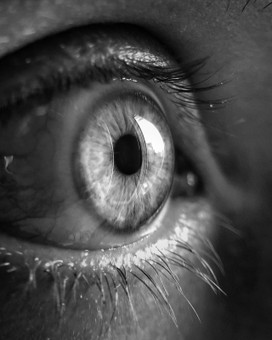It’s common for people getting eye exams to ask about floaters, flashing lights, or “spiderwebs” in their vision. Though they cause no pain, floaters are irritating and distracting when they occur often enough People experiencing floaters describe them as looking like webs, a fly they can't swat, or other shapes. Most of the time, they aren’t a reason for concern, but you should still discuss them with your eye care provider.

What causes me to see spider webs?
Floaters are small, random shapes that drift around in your field of vision. They are usually a result of the gel-like substance behind your eye, called the vitreous humor, thinning and separating from the retina behind it. When the vitreous shrinks, it can result in seeing webs, strings, “bugs,” or other shapes that aren’t real.
Floaters and eye webs never permanently go away, but those afflicted eventually get used to them. They may annoy you for a bit, but vitreous thinning and the resulting floaters and spiderwebs are nothing to cause alarm.
Vitreous shrinkage
Over time, your vitreous gel condenses, and the vitreous humor shrinks, which is perfectly normal with age and wear over time. As it does so, it becomes thin and fibrous. The stringiness of it casts microscopic shadows on the retina, which we can see because they’re on the eye. These shadows are called floaters or spiderwebs.

How can I fix or get rid of eye webs?
There is no practical treatment for vitreous humor thinning, detachment, or shrinkage. Eye care specialists are currently researching ways to slow or reverse it, but as of right now, there is only one option: eye surgery. Even with all of the recent advances, eye surgery is still somewhat risky and not generally advised unless eye problems seriously disrupt your day-to-day life. Floaters aren’t usually considered worth the risk of complications, such as infection, permanent damage, or the development of cataracts.
If you develop cataracts, you will likely need additional surgery to correct them. Cataract surgery works by replacing the damaged part of the eye. Typically, you will get an artificial lens implanted, which takes the place of your natural one.
Cataract surgery is unavailable without first going to your designated eye care specialist for a professional medical diagnosis. While success rates are high, operating on the eye can have downsides, and if the surgery goes wrong, there is a small risk of permanent blindness.
Are you sure that I have nothing to worry about?
While floaters and spiderwebs lurking in your vision don’t indicate anything on their own, they can point to more severe eye problems if they come with a few other symptoms. For example, seeing floaters accompanied by flashes or experiencing a sensation like having a curtain being drawn in front of your eyes can be symptoms of retinal detachment.
Experiencing vision flashes can be pretty disorienting. It’s similar to viewing lightning or looking at the flash of a camera while getting your picture taken. You should see an eye doctor or local eye institute for professional medical advice immediately if you are experiencing these symptoms simultaneously.

Retinal detachment can be serious
If your vitreous humor shrinkage, thinning, or detachment gets bad enough, it may lead to a retinal tear. Smaller tears allow fluid to build up under the retina, which is the leading cause of retinal detachment. Large retinal tears reduce the amount of oxygen available to the retina, leading to permanent damage and blindness in the affected eye.
Retinal detachment is much more severe than vitreous detachment or shrinkage. The longer it goes untreated, the more likely you are to experience permanent vision loss. You should be alert for the signs and symptoms of retinal detachment, such as extreme light sensitivity. Retinal detachment is almost always a guaranteed need for surgery, but the surgery itself has risks. Eye infection, bleeding, and a sometimes dangerously high build-up of pressure in the eye are possible outcomes.
Health Disclaimer:
This article is for informational purposes only. The facts in this article can help you look for signs of potential eye problems, there is no substitute for a professional medical advice or diagnosis. Now that you are aware of the risks and dangers of leaving specific eye ailments untreated, you should also know the importance of seeking professional medical advice as soon as you are able. If you are experiencing floaters, don’t be afraid to address the subject with your eye care professional at your next appointment, even if other symptoms don’t accompany it.
If your eyes are otherwise healthy, but you just need to renew your prescription, feel free to read more about our online eye vision test. We offer a vision test for contact lenses and a vision test for glasses. These tests are not intended to be a substitute for a thorough eye exam, which you can only receive from a licensed eye care professional. WebEyeCare has a wide selection of glasses, contact lenses, and other eye care accessories to help you see more clearly and enjoy life to the fullest!
 Save yourself from getting into rush hours and buy your contacts online.
Save yourself from getting into rush hours and buy your contacts online.








